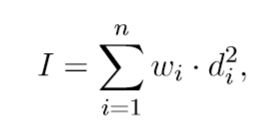Good news for us: to release the financial pressure, the government started selling galaxies and we can buy them from now on! The first one who bought a galaxy was Tianming Yun and he gave it to Xin Cheng as a present.

To be fashionable, DRD also bought himself a galaxy. He named it Rho Galaxy. There are n stars in Rho Galaxy, and they have the same weight, namely one unit weight, and a negligible volume. They initially lie in a line rotating around their center of mass.
Everything runs well except one thing. DRD thinks that the galaxy rotates too slow. As we know, to increase the angular speed with the same angular momentum, we have to decrease the moment of inertia.
The moment of inertia I of a set of n stars can be calculated with the formula

where w
i is the weight of star i, d
i is the distance form star i to the mass of center.
As DRD’s friend, ATM, who bought M78 Galaxy, wants to help him. ATM creates some black holes and white holes so that he can transport stars in a negligible time. After transportation, the n stars will also rotate around their new center of mass. Due to financial
pressure, ATM can only transport at most k stars. Since volumes of the stars are negligible, two or more stars can be transported to the same position.
Now, you are supposed to calculate the minimum moment of inertia after transportation.
The first line contains an integer T (T ≤ 10), denoting the number of the test cases.
For each test case, the first line contains two integers, n(1 ≤ n ≤ 50000) and k(0 ≤ k ≤ n), as mentioned above. The next line contains n integers representing the positions of the stars. The absolute values of positions will be no more than 50000.
For each test case, output one real number in one line representing the minimum moment of inertia. Your answer will be considered correct if and only if its absolute or relative error is less than 1e-9.
2
3 2
-1 0 1
4 2
-2 -1 1 2
(xi - x平均)^2 = xi^2 + x平均^2 - 2*xi*x平均
所以方差 = ∑xi^2 + n*x平均 - 2*∑xi*x平均
设v=n-k,先计算前v个的∑xi^2,算出平均值,就可以算出方差,然后每次向后处理一次,减去前面的一个,加上
后一个,算出平均值,再求出方差,这样就可以在O(n)出结果了。
代码:
#include <iostream>
#include <algorithm>
#include <cstring>
#include <cstdio>
long long a[50005];
using namespace std;
int main()
{
int t,n,k;
scanf("%d",&t);
while(t--)
{
scanf("%d%d",&n,&k);
for(int i = 1;i<=n;i++)
cin>>a[i];
if(n==k)
{
printf("0\n");
continue;
}
sort(a+1,a+n+1);
long long sum = 0;
long long sums = 0;
for(int i = 1;i<=n-k;i++)
{
sum += a[i];
sums += a[i] * a[i];
}
double ave = sum*1.0/(n-k);
double mini = sums + (n-k)*ave*ave - 2*sum*ave;
for(int i = 1 ;i <= k; i++)
{
sum = sum - a[i]+a[n-k+i];
sums = sums - a[i]*a[i]+ a[n-k+i]*a[n-k+i];
ave = sum*1.0/(n-k);
double temp = sums + (n-k)*ave*ave - 2*sum*ave;
if(temp < mini)
{
mini = temp;
}
}
printf("%.10f\n",mini);
}
}
ps:cdd用了一个错误的贪心策略,竟然也能A,还没特判n==k,这真是一个看脸的世界o(╯□╰)o

